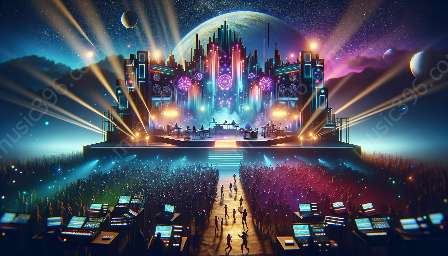Electronic music in video games has become an integral part of the gaming experience, enhancing the atmosphere and immersing players in unique sonic landscapes. The production of electronic music for video games, however, presents technical challenges that need to be carefully addressed to ensure an engaging and immersive gaming experience. In this topic cluster, we'll delve into the complexities of electronic music production for video games, the role of electronic music within the gaming industry, and the innovations that have shaped the landscape of music in gaming.
Role of Electronic Music in Video Games
Electronic music has been used in video games for decades, playing a significant role in setting the tone, enhancing storytelling, and providing a heightened level of immersion for players. The dynamic nature of electronic music allows for the creation of diverse soundscapes that can adapt to in-game actions, moods, and settings, adding a layer of interactivity and emotion to the gaming experience.
From ambient soundscapes to high-energy tracks, electronic music has the flexibility to cater to various gaming genres, from action-packed adventures to atmospheric exploration games. Its versatility and ability to evoke emotion make it a powerful asset in shaping the overall atmosphere of video games.
Technical Challenges in Electronic Music Production for Video Games
While electronic music offers a wide range of creative possibilities for video game soundtracks, its production comes with distinct technical challenges. One of the primary challenges lies in creating adaptive music that seamlessly transitions and responds to the dynamic nature of gameplay. This involves implementing sophisticated audio engines and algorithms to ensure that the music aligns with the in-game events, seamlessly adapting to the changing pace and intensity of the player's actions.
Another technical challenge is related to memory and performance optimization. Given the resource-intensive nature of modern video games, the electronic music production must be mindful of memory constraints and system performance. Composing and integrating music in a way that maximizes efficiency without compromising audio quality is a delicate balance that requires a deep understanding of the hardware and software capabilities of gaming platforms.
Furthermore, the collaboration between composers, sound designers, and game developers adds another layer of technical complexity. Syncing music with in-game events, dialogues, and environmental sound effects requires meticulous coordination and integration within the game's audio framework. Ensuring seamless transitions between music tracks and environmental audio elements is crucial for maintaining a cohesive and immersive experience for players.
Innovations in Electronic Music Production for Video Games
Despite the technical challenges, the field of electronic music production for video games has seen remarkable innovations that have pushed the boundaries of sonic immersion and interactivity. Interactive music systems, such as dynamic music engines and procedural audio techniques, have revolutionized the way music is integrated into games, allowing for adaptive and responsive soundtracks that dynamically evolve based on the gameplay.
Additionally, advancements in audio middleware and audio programming languages have empowered composers and sound designers to create complex musical systems that seamlessly interact with the game's mechanics and events. These innovations have paved the way for a more organic and immersive integration of electronic music, elevating the overall gaming experience to new heights.
Conclusion
Electronic music in video games presents a captivating intersection of artistry and technology, offering a powerful medium for shaping the emotional landscapes of virtual worlds. The technical challenges inherent in electronic music production for video games are met with innovative solutions that continue to evolve the way music is experienced within the gaming industry. As technology advances and creative minds explore new frontiers, electronic music will undoubtedly remain a vital component in crafting unforgettable gaming experiences.


